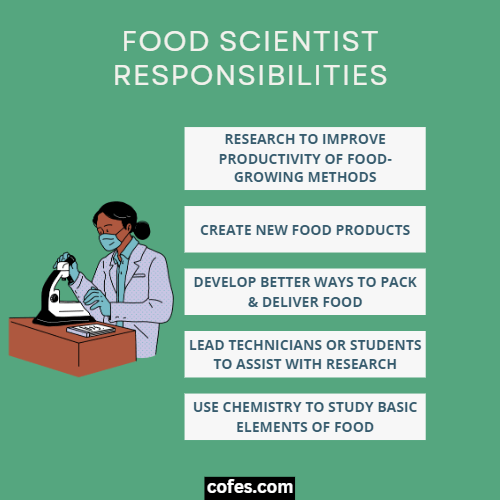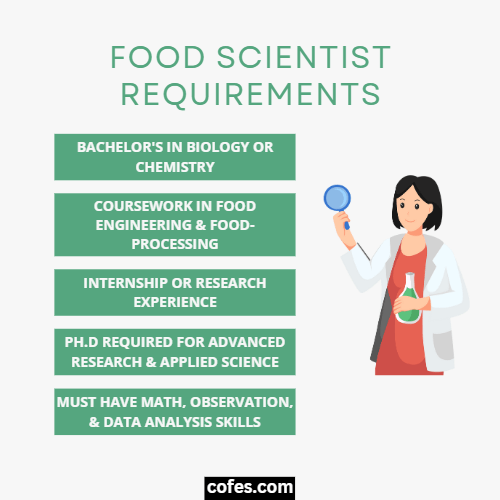Food Scientists hold an essential position in keeping the food we consume healthy and nutritious.
They use chemistry, biology, engineering, and other methods of study to analyze and experiment with food components to add potential health benefits, enhance taste, and find potentially harmful contaminants.
Food Science is an enjoyable field to pursue if you are self-motivated, communicate well, and are fond of discovering new processes and developing theories.
Food Scientist Job Information
| Official Job Title | Food Scientist |
| Average Salary | $64,510 |
| Stress Level | Average |
| Work/ Life | Average |
| Job Satisfaction | Low |
| Career Advancement | Average |
Food Scientist Job Description
What Is A Food Scientist?
Food Scientists work hard to ensure our food is safe and appetizing.
You research the food people eat, search for and create new food sources, and increase the nutrition in processed foods.
Sometimes, you must share your scientific findings with the public or professional audiences through written papers or presentations.
What Does A Food Scientist Do On A Daily Basis?
As a Food Scientist, your daily duties vary based on your specialization.
For most Food Scientists, your primary responsibilities are analyzing the content of various foods to determine their nutritional value, developing new products and sources of food, and inspecting food processing facilities to ensure they meet all standard health guidelines.
You will spend most of your time in a laboratory or office, where you may get the opportunity to create food additives or find substitutions to promote healthier foods and enhance their taste.

Responsibilities, Duties & Roles Of A Food Scientist
One of your most important responsibilities as a Food Scientist is researching and discovering ways to enhance the safety, sustainability, and productivity of crops and farm animals, soil, food packaging processes, and food facilities.
This profession affords you the ability to work independently.
Most Food Scientists are free to form their own individual theories and research methods, so knowing how to manage your time and workload is essential.
Food Scientist Salary
Average Salary
The average annual salary for Food Scientists is $64,510; the range usually falls between $56,810 and $72,080.
Starting Salary
The average entry-level salary of a Food Scientist is $44,289.
Senior Salary
A Senior Food Scientist’s salary comes to around $85,561.
This level of Senior Food Scientist is the highest level you can go to before transitioning into a different, related role.
How To Become A Food Scientist
The Entry Level: Certification, Training & Degree
To become a Food Scientist, you must obtain a minimum Bachelor of Science in Food Science.
Many programs will allow you to specialize in biochemistry, microbiology, nutrition, and food safety.
A Master’s degree or Ph.D. is required if you crave a teaching role or job at a university.
Students aiming for a Ph.D. are encouraged to earn advanced degrees in toxicology or dietetics, and internships are highly recommended overall.
Additional certifications from organizations such as the American Society of Agronomy or the Institute of Food Technologists aren’t required to become a Food Scientist.
Still, they may be helpful when advancing in your career.
Other Skill Sets, Requirements & Qualifications
You should take a humanities course to develop your communication skills and computer courses to familiarize yourself with the programs and software you will use on the job.
You can also apply for an internship to gain research and field experience.
How Long Does It Take To Become A Food Scientist?
It takes, on average, about four years to become a Food Scientist as long as you attend school full-time while earning your bachelor’s degree.
Is It Hard To Become A Food Scientist?
Since there are no advanced certifications or extensive education requirements, it is relatively easy to become a Food Scientist as long as you have a passion for learning several different areas of science.
Food Scientist Career Paths
The Food Scientist Roadmap
Luckily, climbing the career ladder from Food Scientist to Senior Food Scientist is just one step, with the opportunity to transition into a project leader or even manage an entire department.
This job could also land you in a relevant field, such as chemical engineering or agricultural research.

Projections For Growth In Food Scientist Jobs
The trends through 2031 are predicted to grow at a rate of 8%, faster than average compared to other careers.
In Summary: Is Food Scientist A Good Career?
Food Scientist is a good career choice for people curious about discovering new scientific methods and can manage their time well, as a lot of this work is done independently.
However, the satisfaction of this career is low, probably because of the limiting opportunities for growth.
Working Conditions
Can A Food Scientist Work Remotely From Home?
Some companies are offering remote work for Food Scientists.
How Many Hours Does A Food Scientist Work?
The standard working hours for a Food Scientist is the typical 40-hour week, with the occasional necessity to work in the evening.
Can A Food Scientist Work Part-Time?
Most Food Scientists work full-time, but a few companies offer part-time employment.
What Are The Average Vacation Days Of A Food Scientist?
There isn’t much information available about the amount of vacation time for Food Scientists.
However, you are offered insurance benefits and paid vacation if you work full-time.
Alternative Careers & Similar Jobs to a Food Scientist
- Forensic Science Technician
- Nutritionist
- Natural Sciences Manager
- Neuroscientist
- Dietitian
- Hydrologist
- Archaeologist
- Meteorologist
- Marine Biologist
- Physicist
- Research Assistant
Food Scientist Resume Tips
The qualities of a great Food Scientist include advanced knowledge of chemistry and manufacturing processes, mathematics, and biology.
In addition, be sure to mention any experience with food production methods and understanding of the necessary computer software.
It is also good to highlight personal traits such as attention to detail and analytical and critical thinking skills.
Food Scientist Interview Questions
Q1: What does your typical day look like at your current place of employment?
Why it works: Asking this question during an interview can give the employer an idea of the applicant’s current workload and how they manage their time and prioritize tasks.
Q2: Describe an occasion when an idea you had was met with enthusiasm by management.
Why it works: Asking applicants to describe this type of scenario allows them to share if they can come up with fresh ideas and improve processes.
Q3: Do you have experience with quality assurance?
Why it works: This question works well to determine if the applicant has experience with a necessary skill in the Food Scientist field, as they are consistently testing the safety and quality of food.
Jobs Related To Food Scientists
- Microbiologist
- Environmental Scientist
- Biological Technician
- Chemical Technician
- Agricultural Science Technician
- Agricultural Manager
- Biochemist or Biophysicist
- Conservation Scientist or Forester
For HR Manager: Tips For Hiring A Food Scientist
Key Characteristics To Look For In A Food Scientist
A Food Scientist should have excellent communication skills to adequately explain their studies and methods and demonstrate critical thinking, data analysis, and observation skills, all essential traits to succeed in this career.
Minimum Level Of Education & Experience
For Food Scientists, the minimum level of education required is a Bachelor’s degree in Food Science or Agricultural Science.
References
- “Agricultural and Food Scientists : Occupational Outlook Handbook: : U.S. Bureau of Labor Statistics.” Bls.gov, 13 Apr. 2018, www.bls.gov/ooh/life-physical-and-social-science/agricultural-and-food-scientists.htm. Accessed 15 Oct. 2021.
- “Food Scientist.” Payscale.com, 2021, www.payscale.com/research/US/Job=Food_Scientist/Salary. Accessed 15 Oct. 2021.
- “Food Scientist | Explore Careers | National Careers Service.” Service.gov.uk, 2021, nationalcareers.service.gov.uk/job-profiles/food-scientist. Accessed 15 Oct. 2021.
- “Food Scientist: Job Duties, Occupational Outlook, and Education Prerequisites.” Learn.org, 2014,learn.org/articles/Food_Scientist_Job_Duties_Occupational_Outlook_and_Education_Prerequisites.html. Accessed 15 Oct. 2021.
- “Food Technologists & Technicians / Skilled Immigrant InfoCentre.” Pwp.vpl.ca, 2020, pwp.vpl.ca/siic/guides/food-technologists-technicians/. Accessed 15 Oct. 2021.
- “What Does a Food Scientist Do? Role & Responsibilities.” Glassdoor.com, 2021, www.glassdoor.com/Career/food-scientist-career_KO0,14.htm. Accessed 15 Oct. 2021.
